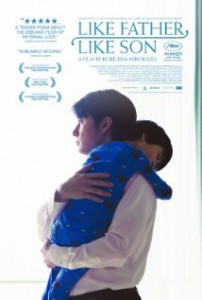[This originally appeared on www.moviewallas.com]
Two couples find out that their five-year old sons had been switched at birth. Think about this premise, and then imagine what most filmmakers might have done with it. To see what Hirokazu Kore-Eda does with this story is to recognize why he is one of the master filmmakers. LIKE FATHER LIKE SON (SOSHITE CHICHI NI NARU) stands head and shoulders above any film I have seen so far this year.
The film presents a fascinating moral quandary. The discovery of a son you weren’t previously aware of is one thing. But that still cannot match the anxiety of knowing that the child you did rear as your own now legally belongs to other parents who could forcibly take him away. Does it matter that the children in this film are only five years old, in that formative phase when they are most impressionable? Would it have been easier if the children were younger? Is it better to just quickly “exchange the kids” as suggested by the lawyers representing the hospital where the mix-up occurred at birth? What carries greater moral imperative: nurture or bloodline? Confronted with this premise, most of us might say that this would be an easy decision: your child is the one you have loved and cared for as your own, not the one connected by genetics; keep the child you have, and bloodline be damned. But the film argues that the situation might not be as simple. How are you to observe a child grow up with other parents and see him start to physically look increasingly like yourself?
Consider the two couples. Ryoto Nonomiya is an aggressively competitive businessman on the fast track to corporate success. His stay-at-home wife, Midori has given up her career to care for their son Keita. Several characters in the film comment that the Nonomiya home in a gleaming high-rise reminds them of a hotel room. This is a family that is not lacking for much. Yudai Saiki works outside of the city in a somewhat run down appliance store and his wife Yukari is employed at a fast-food chain. They support their three kids including the mischievous Ryusei. The paths of the two disparate families intersect when genetic testing initiated by the hospital confirms that Keita and Ryusei were switched at birth.
This story could have lent itself to any manner of tonal or stylistic construct. This might have been a bitter, angry film. It might have been a legal procedural. It might have been a deep, soggy wallow of a movie. But LIKE FATHER LIKE SON is none of those things. Instead the film is elevated because the treatment given to this material is one of quiet observation. Kore-eda has been called an heir to Ozu for reason, not least because of his ability to watch his characters from afar without judgment. And this movie is no exception. It has no interest in melodrama; you will not find a shrill note here. And then there is the one thing about Kore-Eda’s work that makes him one of my favorite filmmakers: he refuses to create villains. There isn’t a mean character in any of his films. Not the over-ambitious Ryoto in LIKE FATHER LIKE SON, not the strict patriarch in WALKING STILL, and not the absent mother in NOBODY KNOWS. Kore-Eda recognizes that people are seldom all-out malevolent, and to his great credit as a scriptwriter, he has never granted himself an easy out by generating conflict by way of an ill-intentioned character. No, the people who populate his stories all mean well; their actions are driven by who they are and their behavior is conditioned by their upbringing and values. But they are all, without exception, decent people. This is what makes Kore-eda the most humanist of all filmmakers working today.
Does it matter that this story plays out in Japan? Not one bit; this film could have been set anywhere in the world. The grandparents are recognizable in their yearning to see more of their children and grandkids, while walking a fine line with not overstepping. Observe the grace and uncannily natural rhythms captured from the child actors here. And when you have as gentle, nonjudicative, and keenly observant a filmmaker as Kore-Eda, the experiences of a specific few slowly begin to reflect the universe. Notice how the specifics of the two families in LIKE FATHER LIKE SON are used to make deft observations about class differences. The Nonomiyas are the definition of cultured living: they eat healthy, have their son tutored for piano, and live in a catalog-ready home. The Saikis are struggling to make ends meet, live in a much smaller space, and are frequently late; but they are also quick to the laugh and agreeably content. When the Nonomiyas suggest that they are financially capable of taking care of both sons, the one they have reared as their own as well as their biological child, the Saikis bristle with honest indignation. See how easy it would be for this film to tip over, if even very subtly, with its sympathies toward one family. It would have been easy to call the rich couple out for their patronizing, intellectual detachment, or call the other couple out for being irresponsible and crude. But the film resolutely does not. It quietly makes it clear that each set of parents are well-meaning and generous in their love for their children. They may be flawed, but both sides are inarguably decent.
It is in this recognition of the decency of those who love a child that the film ultimately provides an abiding definition for family; the only one that matters. That it does so apolitically, unemotionally and with authenticity, is cause for gratitude.
LIKE FATHER LIKE SON is streaming live on Netflix.

No comments:
Post a Comment